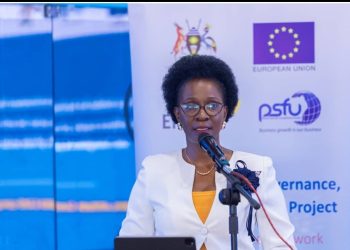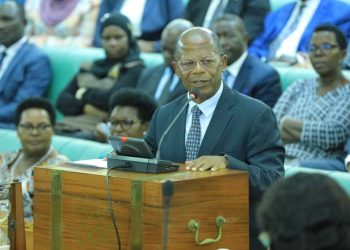Following years of back-door preparatory talks, yesterday President Yoweri Museveni launched the national dialogue project. He said he had been ‘dying’ for an opportunity to dialogue with various actors in the country and also table his key points of discussion.
In his address to various national dialogue stakeholders at State House, Entebbe, Museveni singled out the need to debate the mismanagement of land and the issue of emphasizing identity as opposed to unity which, he said, had been propelled by “opportunistic” people to the detriment of the country.
“I am happy to take part in this national dialogue, and we always like dialogue. It is just a pleasure for me to be in dialogue. I have always been dying for this to tell them, especially those that disagree with us, what we think and why,” he said.
The President noted that for the last 58 years, himself and the National Resistance Movement (NRM) party, have been involved in the political processes in the country. He said the party had a clear idea of the problems and the cure of the challenges that Uganda has.
Museveni’s points
Museveni added that he will use the dialogue platform to clarify on the issues of identity and also tell off people, he described as “opportunistic,” why they need to drop the idea of emphasising identity.
“There are opportunistic groups which emphasise identity to eclipse their interests. These cultural leaders who spend time on identity: it is good to sit with them and I tell them what I believe in and why. You will hear our views,” the President added.
He pledged to table before the national dialogue conference his speech on the role of cultural institutions and leaders, which he presented before the Buganda Lukiiko shortly after the restoration of cultural leaders and institutions in 1993. The other issue that Museveni said he wants the dialogue to tackle is land, especially the fights between landlords and bibanja holders on mailo land, and the land fragmentation practice, which he said, had led to the destruction of land across the country.
“I would want to hear you talk about land. I am glad we are here to dialogue and not to shout at each other. Dialogue is good. I am looking to a really serious dialogue, and see what will come out,” he said.
Over the years, Museveni said NRM has distilled Uganda’s progress in four ideas — patriotism, Pan-Africanism, socio-economic transformation and democracy.
“I do not hear politicians talk about Pan-Africanism, and when you do not talk about Pan-Africanism, I regard you as a danger to Africa,” Museveni said.
Eight key issues
The national dialogue groups, which include the Inter-Religious Council of Uganda, Women Situation Room, the Elders Forum and Citizens Coalition for Electoral Demcoracy in Uganda, tabled eight core issues that the national dialogue, which is set to take shape in March next year, must tackle.
The principles are the need for consensus on national values, diversity, politics, constitutionality and rule of law. Others are land, minimum standards of public service delivery and economy that works for all as well as the implementation of the agreed positions.
They were presented to Museveni by Sheikh Shaban Ramadhan Mubajje, the chairperson of the Inter-Religious Council of Uganda.
“We have listened to Ugandans, and what we have proposed is a full collection of the aspirations of Ugandans and the Uganda we want to see. Ugandans do not trust politicians, religious leaders or any other leader anymore. They have been let down,” Mubajje said.
He noted that the sense of betrayal by the Judiciary, Police, corrupt leaders and the inequitable distribution of the national cake were some of the key points that citizens want the dialogue to squarely tackle.






























































